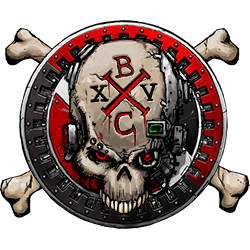The influence grows
This is a little montage of scenes featuring our narrator over the months since the takeover of Outpost Nowa Avestia showing his growth as the squadron's new, and until then, inexperienced sergeant. It shows, also, the slow and subtle growth of the Resistance's s influence on the every day people.
The toll booth stood hunched against the desert wind, a squat collection of hab-blocks and a corrugated checkpoint arch draped with faded banners. The squad passed through without issue, helmets off, weapons slung in casual peace-time readiness. To the locals, we were just another patrol. Nothing worth noting.
It was the toll-keeper who marked me as something else. He was gaunt, eyes sunken deep beneath the brim of his sun-bleached cap. His uniform hung loose, the fabric worn and patched too many times. As we passed, he beckoned me subtly with two fingers, shielding the motion from his comrades. I hesitated but stepped closer.
“Desert wind’s shifting early this season,” he murmured, voice dry as old parchment. In his hand, almost concealed, was a dataslate, sealed and scuffed.
I took it, hesitating for just a heartbeat, then slipped it into my jacket. The act was smooth, practiced — like so many exchanges in the underhive markets of Prawa Ten Drugi. Yet, as I rejoined the squad, I found myself touching the outline of the slate beneath my flak.
It wasn’t the weight that stuck with me, but the look in the toll-keeper's eyes. Hollow, desperate, yet resolute. I recognised it — the same look I’d seen too often in the mines. The slate’s surface felt rough beneath my fingers, etched with faint scratches, like it had passed through more hands than it should have. I told myself I’d examine it later, when there was time and fewer eyes.
-----
Salvager’s Row was always noisy. Even in the early hours, the clatter of tools and metal against metal rang through the alleyways. Stalls lined the cramped lane, cluttered with scrap, old parts, broken cogitators, and the ever-present scent of oil and rust. Sunlight filtered down in pale shafts through the hanging tarps, casting everything in a strange, fractured light.
We’d come into town quiet, uniforms dusty but clean, weapons slung easy, faces unreadable. Just another PDF patrol passing through. The locals didn’t ask questions. Not out loud.
I was waiting by one of the vendor tables, pretending to examine a cracked auspex casing, when she appeared. I didn’t see her at first—just felt someone hovering at my shoulder. I turned, and there she was. Thin. Pale. Her hair was bound up under a grease-streaked scarf, and her overalls were stained from engine work or worse. She didn’t speak at first. Just stared. Eyes wide, not with fear but with the weight of too many sleepless nights. The hard lines on her face, the roughness of her hands—these were things I recognised. I’d seen them in the mirror. I’d grown up among them, deep beneath Prawa Ten Drugi, where life was short and the dust settled in your lungs.
"You’re one of them," she said, barely above a whisper.
My fingers stilled on the casing.
She glanced around quickly. No one was watching. Or if they were, they knew to pretend they weren’t.
"I don’t want trouble," she said quickly. "I just... I need to know. If there’s a way."
Her voice cracked on that last word. I looked at her properly then. She wasn’t looking for salvation. She was looking for meaning. For a chance at something better. Or maybe just something different.
"You’ve lost something," I said quietly.
She nodded. "Everything."
I reached into my coat and pulled out a small, worn token—plain to most, but marked with the faint curve of a crescent and three stars. I placed it on the table between the scrap.
"There’s a place outside town," I said, keeping my voice level. "North side. Just past the pipe junction. After dark."
She stared at the token like it was fire. "And then what?" she asked.
"Then you listen. And decide. No one forces anything. Not at first."
Her hand closed over the token. She didn’t thank me. She didn’t need to. She disappeared into the crowd a moment later, and I turned back to the cracked casing, my heart a little heavier than before.
We weren’t just fighting a war. We were building something. One soul at a time.
-----
The fire was low, its orange glow flickering against the canvas of our makeshift shelter. We’d set up camp behind a low dune, far enough off the road to avoid attention, but close enough to move at dawn. The stars above were sharp tonight, scattered across the desert sky like shards of broken glass.
Someone had brewed recaf that tasted like burnt mud, but no one complained. We sat in a loose circle, armour off, lasrifles within reach, fatigue etched into every line of our faces.
"Remember the old mess hall in Shaft VII?" Laska said, stirring the recaf with the tip of her knife. "Back when a hot meal meant boiled ration bricks and sulphur-salt gravy?"
There were groans and a few hollow chuckles. I smirked, shaking my head. "Only thing worse than the food was the shift foreman’s singing."
"Ugh, have mercy," someone muttered. "He thought he was a choir-servo."
"Sounded more like a dying generator," Varan added.
"I’d have taken the generator. At least it didn’t try to chat up the pit boss with that voice."
"Didn’t stop him trying, though," said Branka, one of our newest troopers, grinning as she leaned back on her elbows. "She said she’d rather kiss a sump rat."
"A sump rat wouldn’t have smelled half as bad," Laska piped up, and the group broke into laughter.
It was the kind of laughter that came when nerves had been frayed too long, when sleep was thin and the days too hot. But it helped. For a few minutes, we weren’t soldiers. We were just people again—miners in uniform, thrown into something far larger than themselves.
I watched them in the firelight. These were my people now. Not just comrades, not just survivors. They looked to me now, not because they had to, but because they chose to. That realisation sat strangely in my chest. Heavy, but not unwelcome.
No one spoke of the things we’d done. Not directly. But when the silence fell again, it was thick with shared understanding. Mona had once said that families were forged in hardship, not blood. Out here, in the dark, I understood what she meant.
"Get some sleep," I said eventually, rising to my feet and brushing the dust from my coat. "We move before the sun’s up."
They didn’t argue. Just nodded and settled in, one by one.
I stayed up a little longer, watching the fire shrink to embers, the desert whispering in the dark beyond. The wind carried grit, but also something else. Something like purpose.
And for once, I didn’t feel alone.
Writer's note: I think the campfire scene is probably one of the cheesiest I've ever written. I was trying to convey, along with the other two scenes, their humanity. Instead, I got a B-movie sci-fi, haha!


1 Comment
Recommended Comments
Create an account or sign in to comment
You need to be a member in order to leave a comment
Create an account
Sign up for a new account in our community. It's easy!
Register a new accountSign in
Already have an account? Sign in here.
Sign In Now